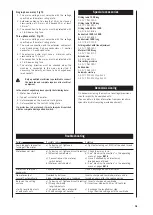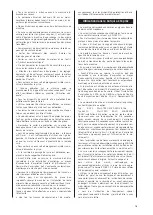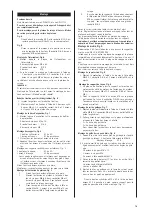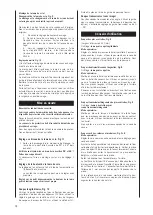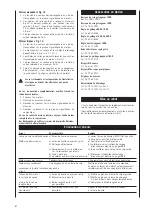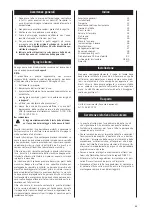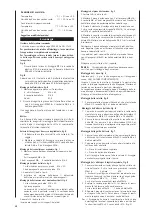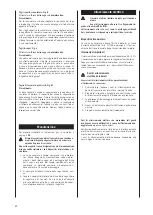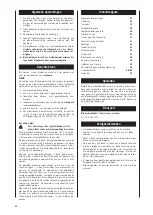
14
Single-phase motor, Fig 13
1. The mains voltage must coincide with the voltage
specified on the motor’s rating plate.
2. Extension cables up to a length of 25-m must have a
cross-section of 1.5 mm
2
, and beyond 25 m at least
2.5 mm
2
.
3. The connection to the mains must be protected with
a 16 A slow-acting fuse.
Three-phase motor, Fig. 14
1. The mains voltage must coincide with the voltage
specified on the motor’s rating plate.
2. The mains connection and the extension cable must
have 5 conductors: 3 phase conductors + 1 neutral
con 1 earth conductor.
3. The extension cable must have a minimum cable
cross-section of 1.5 mm
2
.
4. The connection to the mains must be protected with
a 16 A slow-acting fuse.
5. The rotating direction must be checked when the
machine is connected to the mains or re-sited. If
necessary, the polarity will have to be changed over
(wall socket).
Only a qualified electrician is permitted to connect
the machine and complete repairs on its electrical
equipment.
In the event of enquiries please specify the following data:
1. Motor manufacturer
2. Type of current of the motor
3. Data recorded on the machine’s rating plate
4. Data recorded on the switch’s rating plate
If a motor has to be returned, it must always be dispatched
with the complete driving unit and switch.
Special accessories
Sliding table 1200 long
Art. Nº. 7951 0000
Sliding table 1500 long
Art. Nº. 7951 0901
Sliding table 850 to 1500
Art. Nº. 5320 8183
Rabbet rail 1350 to 2500
Art. Nº. 5320 8180
Rabbet ruler 1500 long
Art. Nº. 5410 7003
Folding rabbet with fine adjustment
Art. Nº. 7939 0301
Main rail 1500 long
Art. Nº. 7951 4100
Drive device
Art. Nº. 5267 0701
Tile cutting provision
Art. Nº. 7961 0901
Rail handles
Art. Nº. 7963 1000
Automatic start-up
Art. Nº. 7910 4010 Typ ALV 2
Art. Nº. 7910 4020 Typ ALV 10
Decommissioning
On decommissioning the machine local legal provisions
should implicitly be complied with.
(You can obtain further information from your locally re-
sponsible district recycling waste department)
14
Troubleshooting
Failure
Possible cause
Solution
Saw blade gets loose after
a) Fastening nut tightened
a) Tighten fastening nut, M20 left-handed thread
turning off the motor
insufficiently
Motor does not start
a) Fastening nut tightened insufficiently a) Check the mains fuse.
b) Extension cable defect
b) See “Electrical Connection” in the operating
manual, pages
GB 16
c) Connections on the motor or
c) Have it checked by an electrician
switch defect
Brake does not bleed
d) Motor or switch defect
d) See “Electrical Connection” in the operating
manual, pages
GB 16
Motor runs forward or
Capacitor defect
Have it exchanged by an electrician
backwards
No motor output
Overload by dull saw
Insert a sharpened saw blade; motor can be
turns off automatically
blade, thermoprotection is triggered
turned on again after the cooling period
Burns on the cutting
a) Fastening nut tightened insufficiently a) Insert a sharpened saw blade
surface
b) Wrong saw blade
b) Insert saw blade with 20 or 28 teeth for
longitudinal cuts
c) with longitudinal cuts
c) Longitudinal stop not parallel
c) Exchange the longitudinal stop
d) with cross cuts
d) Slide carriage not parallel
Align the slide carriage with the saw blade















